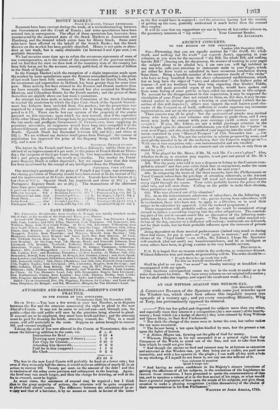ANCIENT CONCERTS.
TO THE EDITOR OF THE SPECTATOR.
London, lath December 1833,
Sua—Presuming that you are equally anxious for "the trutll, the whole truth, and nothing but the truth"- (as regards facts), appearing in your columns, as you were for the success of " the Bill, the whole Bill, rind nothingbut the Bill !' ( leaving out, for the present, the manner of treating in your pages
the subject about to be alluded to), I am sure you will full indebted to any one who calls your attention to statements made in your Paper, which are either far from truth or calculated to have erroneous conclusions draWn
'from them. Being a humble member of the numerous family of " the sticks" who have so long benefited from the above calumniated establishment, which has so long been the object of "envy and admiration "—the highest point of honour—I and my brethren have been long expecting that brother Fiddle, or some still more powerful organ of our family, would have spoken out from some feeling of amor patruc to have called our attention to this subject.. To account for the disappointment in this expectation, it may be supposed the circulation of your Paper does not extend to them, or, if it does, it may be con- sidered useless to attempt gaining a hearing at your tribunal (which the in- sertion of this will disprove); others may suppose the well known good cha- racter of the Concerts is, of itself, sufficient to render nugatory any erroneous representation, and act ou the principle, aguila mar eaptat muscas. These reasons may all be good : but the systematized attacks may mislead many who have only your columns and effusions to guide them, and I own many may justly be content with. your caterings (with certain saves and excepts). If you, Mr. Editor, are not a wilful particeps criminis in the abuse heaped upon the aforesaid establishment, you will insert his " tattoo" in your next Paper, and also state the result of your inquiries into the truth of state- ments contained in your "Musical Prospect" of 17th November last. ... fey queries I suggest. lit, Was not the reduction in salaries proposed by some, and most gladly acceded to by all the orchestra, that the Concerts might go on 2—. \Vitli pile or two exceptions only—one instrumentalist and one vocalist. 2d. Was Mr. CRAMER, absent six concerts and six rehearsals, or only three as stated by you ? :11. Who played for 31r. Moan, if Mr. 3I. took Mr. CR A :K E it's place? Also, whether to do so, as occasion may require, is out part and parcel of • Mr. M.'s engagement without extra pay ? 4th. Was the party who said it was a disgrace to belong to the Concerts com- pelled to attend ? and does your critic think that an engagement, under the same circumstances, would be declined, if offered, for the next year ? 5th. In comparing the terms of the three concerts, have the Philharmonic or Vocal Concert subscribers the privilege of attending rehearsals, as the Ancient have? The Ancient Band numbers 120 vocal and instrumental performers every night through the season. Your critic probably knows the power of the other two, and will state them. Calling on the public to make their election, these particulars are required. 6th. Who was elbowed out of his situation?
7th. As to the indiscriminate admission of subscribers, do the following re- gulations favour such an assertion ? viz., parties having been subscribers, will be readmitted, those who have not, to apply to a Director, or to send their names to be submitted for approval. (See the inclosed programme.) These suggestions will probably suffice, and the result be considered strong enough to induce a searching invnirg into the oilier allegations. The conclud- ing part of the article savours IDUCII like an illustration of the following senti- ment, taken, I believe, from your pages. " The hasty and unfair musical cri- ticism of the day, consists in a dishonest self-seeking ; sentiments are delivered, not for their truth, but for their probable influence upon the interests of private parties." Being dependent on these musical performances (indeed very much so during these bad times, for pay is sure—no "call again to morrow," and your own choice of the "legal tender "—no trifles, Mr. Editor), I hope Mr. Spectator will overlook (but not omit) any huindruminishness, and be as indulgent as many others have been, in giving a corner to his very humble servant,
Disumsricx.
P.S. It is hoped that no treason exists in the orchestra, as sometimes dreamt. Without followers true and stanch, no geuerahship will do. The order should be-
" If such there be—go mark hint well, For him 110 Ancient sounds shall swell." Shall be glad to see you "as usual" on Sunday morning at breakfast—but accompanied with my epistle.
[Our factitious correspondent collies too late in tire week to enable us to do more than insert his letter. We have every reliance on our original information ; but we shall make due inquiry, and report the result next week.—En.) •
















 Previous page
Previous page